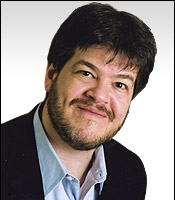 Former plagiarist Jeff Jacoby has a new column in the Boston Globe, in which he repeats the same tired memes regarding global warming.
Former plagiarist Jeff Jacoby has a new column in the Boston Globe, in which he repeats the same tired memes regarding global warming.
Step 1: Portray global warming as a religion:
"global warming apostle"[Despite the fact that the vast majority of scientific organizations and peer-reviewed literature support it.]
Step 2: Turn it into an issue about Al Gore, then make fun of him while referencing the Internet:
"But as with other claims Gore has made over the years ("I took the initiative in creating the Internet"), this one doesn't mesh with reality."[First of all, when you look at the transcript, Gore was claiming that he fostered the development of the Internet in a legislative and economic sense. This meme will probably never die. Second, this isn't about Al Gore.]
Step 3: Mention an anecdote about the few vocal and active contrarian scientists, and then claim that there are plenty of scientists on your side:
"Scientists and other "serious people" who question the global warming disaster narrative are not hard to find. Last year 60 of them sent a letter to Prime Minister Stephen Harper of Canada, urging him to undertake "a proper assessment of recent developments in climate science" and disputing the contention that "a climate catastrophe is looming and humanity is the cause."[If these people think so, they should publish some real science in a real peer-reviewed journal, rather than sending petitions to Canadians.]
Step 4: If the peer-reviewed science and major organizational bodies aren't on your side, resort to opinion polls:
"In 2003, environmental scientists Dennis Bray and Hans von Storch surveyed 530 of their peers in 27 countries on topics related to global warming. One question asked: "To what extent do you agree or disagree that climate change is mostly the result of anthropogenic causes?" On a scale of 1 (strongly agree) to 7 (strongly disagree), the average score was 3.62, reflecting no clear consensus."[Von Storch explains how skeptics make too much of this opinion poll here.]
Step 5: Take a statistically insignificant data adjustment, and act like it turns decades of research on its head:
"Or take the discovery this month that 1934, not 1998, was the hottest year in the continental United States since record-keeping began. NASA's Goddard Institute for Space Studies quietly changed its ranking after a Canadian statistician discovered an error in the official calculations. Under the new data, five of the 10 hottest US years on record occurred before 1940; three were in the past decade. Climate scientists are still trying to get the basics right."
Step 6: Sweeping conclusion. Don't forget Al Gore.
"The science of climate change is still young and unsettled. Years of trial and error are still to come. Al Gore notwithstanding, the debate is hardly over."










No comments:
Post a Comment